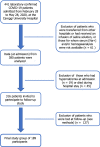Relationship between hyponatremia at hospital admission and cardiopulmonary profile at follow-up in patients with SARS-CoV-2 (COVID-19) infection
- PMID: 36284058
- PMCID: PMC9595583
- DOI: 10.1007/s40618-022-01938-9
Relationship between hyponatremia at hospital admission and cardiopulmonary profile at follow-up in patients with SARS-CoV-2 (COVID-19) infection
Abstract
Purpose: Hyponatremia occurs in about 30% of patients with pneumonia, including those with SARS-CoV-2 (COVID-19) infection. Hyponatremia predicts a worse outcome in several pathologic conditions and in COVID-19 has been associated with a higher risk of non-invasive ventilation, ICU transfer and death. The main objective of this study was to determine whether early hyponatremia is also a predictor of long-term sequelae at follow-up.
Methods: In this observational study, we collected 6-month follow-up data from 189 laboratory-confirmed COVID-19 patients previously admitted to a University Hospital. About 25% of the patients (n = 47) had hyponatremia at the time of hospital admission.
Results: Serum [Na+] was significantly increased in the whole group of 189 patients at 6 months, compared to the value at hospital admission (141.4 ± 2.2 vs 137 ± 3.5 mEq/L, p < 0.001). In addition, IL-6 levels decreased and the PaO2/FiO2 increased. Accordingly, pulmonary involvement, evaluated at the chest X-ray by the RALE score, decreased. However, in patients with hyponatremia at hospital admission, higher levels of LDH, fibrinogen, troponin T and NT-ProBNP were detected at follow-up, compared to patients with normonatremia at admission. In addition, hyponatremia at admission was associated with worse echocardiography parameters related to right ventricular function, together with a higher RALE score.
Conclusion: These results suggest that early hyponatremia in COVID-19 patients is associated with the presence of laboratory and imaging parameters indicating a greater pulmonary and right-sided heart involvement at follow-up.
Keywords: Follow-up; Hyponatremia; Outcome; Pneumonia; SARS-CoV-2 (COVID-19) infection; SIAD.
© 2022. The Author(s).
Conflict of interest statement
The authors declare that there is no conflict of interest that could be perceived as prejudicing the impartiality of the research reported.
Figures
References
Publication types
MeSH terms
LinkOut - more resources
Full Text Sources
Medical
Research Materials
Miscellaneous



